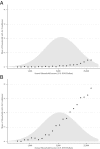Contribution of air conditioning adoption to future energy use under global warming
- PMID: 25918391
- PMCID: PMC4434761
- DOI: 10.1073/pnas.1423558112
Contribution of air conditioning adoption to future energy use under global warming
Abstract
As household incomes rise around the world and global temperatures go up, the use of air conditioning is poised to increase dramatically. Air conditioning growth is expected to be particularly strong in middle-income countries, but direct empirical evidence is scarce. In this paper we use high-quality microdata from Mexico to describe the relationship between temperature, income, and air conditioning. We describe both how electricity consumption increases with temperature given current levels of air conditioning, and how climate and income drive air conditioning adoption decisions. We then combine these estimates with predicted end-of-century temperature changes to forecast future energy consumption. Under conservative assumptions about household income, our model predicts near-universal saturation of air conditioning in all warm areas within just a few decades. Temperature increases contribute to this surge in adoption, but income growth by itself explains most of the increase. What this will mean for electricity consumption and carbon dioxide emissions depends on the pace of technological change. Continued advances in energy efficiency or the development of new cooling technologies could reduce the energy consumption impacts. Similarly, growth in low-carbon electricity generation could mitigate the increases in carbon dioxide emissions. However, the paper illustrates the enormous potential impacts in this sector, highlighting the importance of future research on adaptation and underscoring the urgent need for global action on climate change.
Keywords: adaptation; air conditioning; climate change; energy demand; energy efficiency.
Conflict of interest statement
The authors declare no conflict of interest.
Figures





References
-
- US Department of Energy 2014. Residential Energy Consumption Survey. Available at www.eia.gov/consumption/residential/
-
- Euromonitor International . Air Treatment Products in China. Euromonitor International; Shanghai, China: 2014.
-
- Sivak M. Will air conditioning put a chill on the global energy supply? Am Sci. 2013;101(5):330–333.
-
- Hausman J. Individual discount rates and the purchase and utilization of energy-using durables. Bell J Econ. 1979;10(1):33–54.
-
- Dubin J, McFadden D. An econometric analysis of residential electric appliance holdings and consumption. Econometrica. 1984;52(2):345–362.
LinkOut - more resources
Full Text Sources
Other Literature Sources
Research Materials

